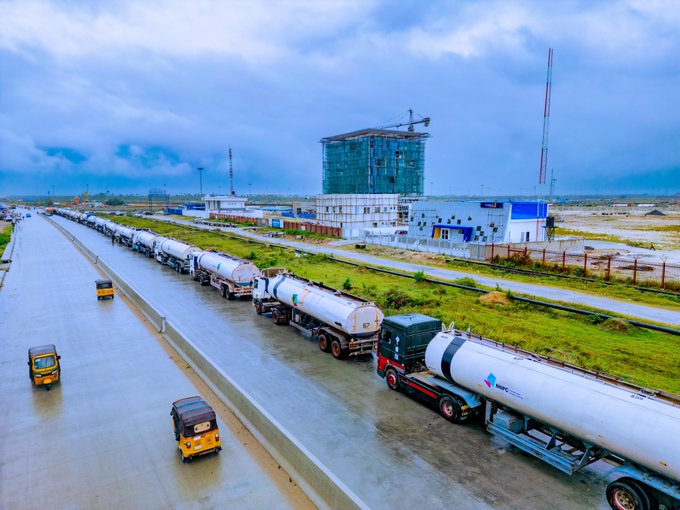In a decisive move to enhance road safety and reduce tanker-related accidents, the Federal Government has announced a ban on 60,000-litre petroleum tankers from operating on Nigerian roads, effective March 1. The restriction, spearheaded by the Nigerian Midstream and Downstream Petroleum Regulatory Authority (NMDPRA), is part of broader reforms to regulate fuel transportation.
The Chief Executive of NMDPRA, Mr. Ahmed Farouk, made the declaration on Wednesday in Abuja after a crucial Stakeholders Technical Committee Meeting. He further disclosed that by the last quarter of 2025, the ban would extend to 45,000-litre fuel tankers, significantly altering the petroleum distribution landscape in Nigeria.
“The goal is to mitigate the rising number of road mishaps linked to oversized petroleum trucks. From March 1, any truck carrying more than 60,000 litres of fuel will be barred from loading at any depot,” Farouk stated.
The high-profile meeting included representatives from the Department of State Services (DSS), the Federal Road Safety Corps (FRSC), the Federal Fire Service, the Standards Organisation of Nigeria (SON), the National Union of Petroleum and Natural Gas Workers (NUPENG), and the Depot and Petroleum Products Marketers Association of Nigeria (DAPPMAN), among others.
A Consensus for Safer Roads
Mr. Ogbugo Ukoha, the NMDPRA Executive Director of Distribution Systems, Storage, and Retailing Infrastructure, who spoke on behalf of Farouk, emphasized that the decision was reached through collaboration with all stakeholders.
“For the first time, we have built consensus among relevant parties, and we are committed to implementing measures that will ensure the safe transportation of petroleum products across the country,” Ukoha said.
The move follows growing concerns over the frequent road crashes caused by overloaded petroleum tankers. Reports have shown that many of these accidents lead to devastating fires, loss of lives, and significant economic damages.
Fuel Quality Debate Sparks Controversy
Amid the announcement, Farouk also addressed growing concerns regarding the quality of petroleum products circulating in the country. He dismissed recent allegations that the fuel being distributed does not meet regulatory standards, describing such claims as “bogus and misleading.”
“All imported and locally refined petroleum products meet strict regulatory standards before being released into the market,” he asserted. “We ensure compliance with the Petroleum Industry Act (PIA) and all quality parameters set by the Standards Organisation of Nigeria.”
He further criticized social media reports alleging poor fuel quality, urging Nigerians to disregard such claims. “It is disrespectful to assume Nigerians are gullible. People should be more responsible with the information they share,” he added.
Decline in Fuel Consumption Post-Subsidy
Farouk also provided insights into fuel consumption trends since the removal of fuel subsidies. According to him, Nigeria’s daily consumption of Premium Motor Spirit (PMS) has dropped from an average of 66 million litres before the subsidy withdrawal to around 50 million litres.
“Before the current administration came in, the daily PMS supply stood at about 66 million litres. Following the withdrawal of the subsidy, we have seen a steep decline, and we are now maintaining a supply rate of approximately 50 million litres daily,” he noted.
He revealed that domestic refineries currently contribute less than 50% of the nation’s PMS supply, necessitating reliance on imports to meet demand. However, none of the local Oil Marketing Companies (OMCs) with refineries have imported PMS this year, leaving the shortfall to be covered by independent marketers.
“If we fail to bridge this supply gap, we will experience fuel scarcity. The regulator is ensuring there is sufficient supply of petroleum products across the country,” he added.
New Safety Measures for Fuel Transportation
The ban on 60,000-litre tankers is only one aspect of the government’s broader strategy to enhance road safety. Experts have long advocated for stricter regulations on fuel transportation due to Nigeria’s history of tragic tanker explosions.
The government’s plan aligns with global best practices that limit fuel tanker capacities to reduce risks associated with transporting hazardous materials. Industry stakeholders have lauded the initiative, acknowledging that oversized tankers often pose severe safety hazards on Nigerian roads.
With these regulations, authorities hope to significantly cut down the frequency of fuel tanker-related accidents and create a safer road transport system for both motorists and pedestrians.
Industry Reactions and the Road Ahead
Reactions to the ban have been mixed. While safety advocates have welcomed the move, some transporters and petroleum marketers fear it may lead to logistical challenges and increased transportation costs.
A member of the National Association of Road Transport Owners (NARTO), who spoke on condition of anonymity, warned that the ban could affect fuel distribution efficiency. “Most depots were designed to load large-capacity tankers. This policy may disrupt the supply chain if alternatives are not well managed,” he cautioned.
However, NMDPRA maintains that the policy is non-negotiable and necessary to safeguard lives and property. “We are not just making rules; we are ensuring a sustainable and secure petroleum distribution system,” Farouk emphasised.

